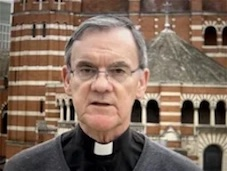Media bishop: Machines should assist not replace

Bishop John Arnold
Source: CBCEW, Vatican News
Bishop John Arnold, Lead Bishop for Communications, has spoken about Pope Francis' message for World Communications Day and the role Artificial Intelligence plays in the development of information technology. The day, celebrated on Sunday 12 May, has as its theme 'Artificial Intelligence and the Wisdom of the Heart: Towards a Fully Human Communication'.
The pace at which AI is developing is extraordinary. The ethical questions surrounding the technology will always need amplifying - how AI impacts on how we think, the dignity of work, how we use the information, its sourcing and accuracy, global regulation - and much more.
Pope Francis is keen to stress that communication needs to be authentic and human. We must speak from that most human of organs, the heart. Bishop Arnold agrees:
"Just about every invention that we have, there's a negative side, and we've got to be sure to identify that," he says. "The human heart can help our discernment as to what is good for humanity, what progresses who we are, what adds to our dignity, our well-being, but also to identify those things that are not so positive, those things that can be destructive."
But being people of God, perhaps we have an advantage. We are acutely aware not to make gods out of ourselves. We have a higher authority - a divine regulator - to help us maintain our humanity and perspective.
"We, as Christians, rely very much on the guidance of the Spirit, on providence in our lives, to guide us in much of what we do," says Bishop Arnold. "Machines can't dictate that for us. We've got to maintain a sense of independent thinking, independent discernment and wisdom in order to find the best way forward. What is God asking of us as individuals? As a community? As a global humanity?
"Let's use machines to assist us in what we're doing to make our world a better place, to enhance the way we live. But let's not allow machines in any way to think for us or to make decisions which are not appropriate."
When we focus on the positives of Artificial Intelligence, the speed at which information can be gathered and shared, how it can be made more accessible to people across the globe - the so-called 'death of distance' - we can see examples of how the technology is enabling a global audience to access what the Church says on any given subject. Magisterium AI is a chatbot that makes the teaching of the Catholic Church available 24/7 at incredible speed using more than 6,000 documents as its knowledge base.
Bishop Arnold considers it a very useful bank of knowledge:
"It has the technical ability to give you exactly what you're looking for in an instant, instead of wondering through a library and looking through thousands of pages, hoping that what you want is in a particular volume. It does it all for you, and that's something which is making learning accessible.
"It's not changing learning, and it's not dictating anything that hasn't been approved as being Magisterium of the Church. It's simply keeping in a store, in an enormous bank with wonderful search facilities, what the teaching of the Church is and how that applies to us. That's a real asset, but it's not intelligence."
So on World Communications Day, Bishop John Arnold is encouraging Catholics to embrace the technology in terms of how it serves the common good, but there is a key caveat:
"As individuals we've got to be very careful to recognise that we can be led astray by fake information, and to make sure that we're testing what we hear before we proclaim it to be true.
"The technology could be of enormous value to us, but we've got to identify clear boundaries as to what can be good and useful and what really needs to be avoided."
LINKS
Pope Francis: AI can never replace wisdom of human heart - Jan 24th, 2024 www.indcatholicnews.com/news/48985
Pope Francis Message for World Communication Day 2024: www.vatican.va/content/francesco/en/messages/communications/documents/20240124-messaggio-comunicazioni-sociali.html


















